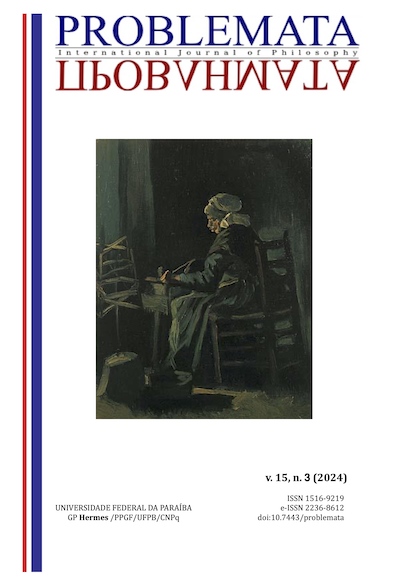TECHNOLOGICAL SOLUTIONISM:
A STUDY ON HOW THE IDEOLOGIZATION OF TECHNOLOGY CAN BRING RISKS TO DEMOCRACY
DOI:
https://doi.org/10.7443/problemata.v15i3.69849Keywords:
solutionism, Technology, Data Protection, fundamental rights, DemocracyAbstract
The objective of this research is to analyze whether adherence by the State and citizens to the ideology of technological solutionism can generate impacts on democracy. The technological hypothesis raised is that the transfer of State duties to companies can affect democracy. The justification for the analysis carried out is based on the social and legal importance of discussing the positive and negative effects of technology on democracy and fundamental rights. The research is guided by the hypothetical deductive method, with a qualitative approach, basic nature and exploratory study, based on a bibliographic survey in magazines and books. As main results, it is obtained that the solutions presented through information and technology can both be beneficial for democracy and can generate risks to its maintenance. However, in relation to the transfer of state duties to technology companies, there would be a democratic problem. This study contributed to the identification of a problem that arises from advances in technology, that is, the risks to democracy and fundamental rights arising from orientation towards the ideology of technological solutionism. Future research can investigate the problem in order to identify effective measures capable of avoiding it.
Downloads
References
ANGWIN, Julia et al. Machine Bias. Pro Publica. 23 mai. 2016. Disponível em: https://www.propublica.org/article/machine-bias-risk-assessments-in-criminal-sentencing. Acesso em: 06 ago. 2023.
BRANCO, Priscilla Alves Teixeira. Smart Cities como dispositivos biopolíticos. In: Anais do VI Simpósio Internacional LAVITS 2019: “Assimetrias e (In)Visibilidades: Vigilância, Gênero e Raça”. Salvador: Ed. dos autores, 2019. Disponível em: https://lavits.org/wp-content/uploads/2019/12/TeixeiraBlanco-LAVITISS-2019.pdf. Acesso em: 31 jun. 2023.
CESARINO, Letícia. O mundo do avesso: verdade e política na era digital. São Paulo: Ubu Editora, 2022.
DESORDI, Danubia; BONA, Carla Della. A inteligência artificial e a eficiência na administração pública. Revista de Direito. Viçosa, v. 12, n. 02, p. 1-22, 2020. Disponível em: https://dialnet.unirioja.es/servlet/articulo?codigo=8113569. Acesso em: 07 jul. 2023.
DONEDA, Danilo. Da privacidade à proteção de dados pessoais: fundamentos da lei geral de proteção de dados pessoais. 2. ed. rev e atual. São Paulo: Thomson Reuters, 2020.
FOCKINK, Caroline. Os efeitos negativos da corrupção nas instituições públicas e no regime democrático. Revista de Direitos Fundamentais & Democracia, Curitiba, v. 24, n. 3, p. 181-210, set./dez. 2019. Disponível em: https://doi.org/10.25192/issn.1982-0496.rdfd.v24i31331. Acesso em: 10 ago. 2023.
GOLDENSMITH, Stephen. CRAWFORD, Susan. The responsive city: engaging communities throuhg data-smart governance. 1ª Ed. United States of America: Jossey-Bass, 2014.
HEIMANS, Jeremy; TIMMS, Henry. Understanding “New Power”. Harvard Business Review. Dez. 2014. Disponível em: https://hbr.org/2014/12/understanding-new-power. Acesso em: 10 ago. 2023.
KAUFMAN, Dora. “Estado-Plataforma": o poder das Big Techs. Época Negócios. 11 nov. 2020. Disponível em: https://epocanegocios.globo.com/colunas/IAgora/noticia/2020/11/estado-plataforma-o-poder-das-big-techs.html. Acesso em: 08 ago. 2023.
LEAL, Mônia Clarissa Hennig; MAAS, Rosana Helena. “Dever de proteção estatal”, “proibição de proteção insuficiente” e “proibição de excesso”: espectro de sua conformação e desenvolvimento pela teoria constitucional alemã. Revista Brasileira de Estudos Políticos. N. 125. Belo Horizonte. jul./dez. 2022. p. 397-438.
MORAES, Maria Valentina de; LEAL, Mônia Clarissa Hennig. O diálogo institucional e as teorias da democracia: contribuições do modelo deliberativo para a articulação entre poderes no Brasil. Revista de Direitos Fundamentais & Democracia, Curitiba, v. 25, n. 3, p. 32-48, set./dez. 2020. Disponível em: https://doi.org/10.25192/issn.1982-0496.rdfd.v25i31268. Acesso em: 10 ago. 2023.
MOROZOV, Evgeny. Big Tech: a ascensão dos dados e a morte da política. Tradução: Claudio Marcondes. São Paulo: Ubu Editora, 2018.
MOROZOV, Evgeny. La locura del solucionismo tecnológico. Traducido por Nancy Viviana Piñero. Buenos Aires: Katz Editores, 2016.
O’NEIL; Cathy. Algoritmos da destruição em massa: como o big data aumenta a desigualdade e ameaça a democracia. Tradução: Rafael Abraham. 1ª Ed. Santo André: Editora Rua do Sabão, 2020.
PIMENTA, Laura Nayara; HENRIQUES, Márcio Simeone; BARBOSA, Pedro Henrique Mamede. ¡Es simples! Está em la palma de las manos: el solucionismo tecnológico de problemas complejos a través de la aplicación “meu vereador”. In: ¿Quién se apropia de qué? Tecnologías digitales em el capitalismo de plataformas. Susana Morales; Elizabeth Vidal (Coords.). 1ª Ed. Buenos Aires: CLACSO, 2022.
SILVA, Gildemarks. Tecnologia, educação e tecnocentrismo: as contribuições de Álvaro Vieira Pinto. Revista Brasileira de Estudos Pedagógicos. V. 94, N. 238. p. 839-857. set./dez. 2013. Disponível em: https://doi.org/10.24109/2176-6681.rbep.94i238.361. Acesso em: 31 jul. 2023.
SUPREMO TRIBUNAL FEDERAL. Audiência Pública – Marco Civil Da Internet, 2023. Disponível em: https://www.youtube.com/watch?v=pEFJYIqflGs. Acesso em: 07/08/2023.
THALER, Richard H.; SUNSTEIN, Cass R. Nudge: improving decisions about health, wealth and happiness. New Haven: Yale University Press, 2008.
ZUBOFF, Shoshana. A era do capitalismo de vigilância. Tradução: George Schlesinger. 1ª Ed. Edição digital: Intrínseca, 2021.
Downloads
Published
Issue
Section
License
Copyright (c) 2024 Carla Fernanda Prim Marzani, Joyce Finato Pires

This work is licensed under a Creative Commons Attribution 4.0 International License.
Authors who publish with this journal agree to the following terms:
- Authors retain copyright and grant the journal right of first publication with the work simultaneously licensed under a Creative Commons Attribution License that allows others to share the work with an acknowledgement of the work's authorship and initial publication in this journal.
- Authors are able to enter into separate, additional contractual arrangements for the non-exclusive distribution of the journal's published version of the work (e.g., post it to an institutional repository or publish it in a book), with an acknowledgement of its initial publication in this journal.
-
- Authors are permitted and encouraged to post their work online (e.g., in institutional repositories or on their website) prior to and during the submission process, as it can lead to productive exchanges, as well as earlier and greater citation of published work (See The Effect of Open Access).





